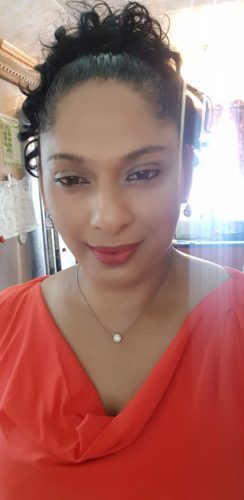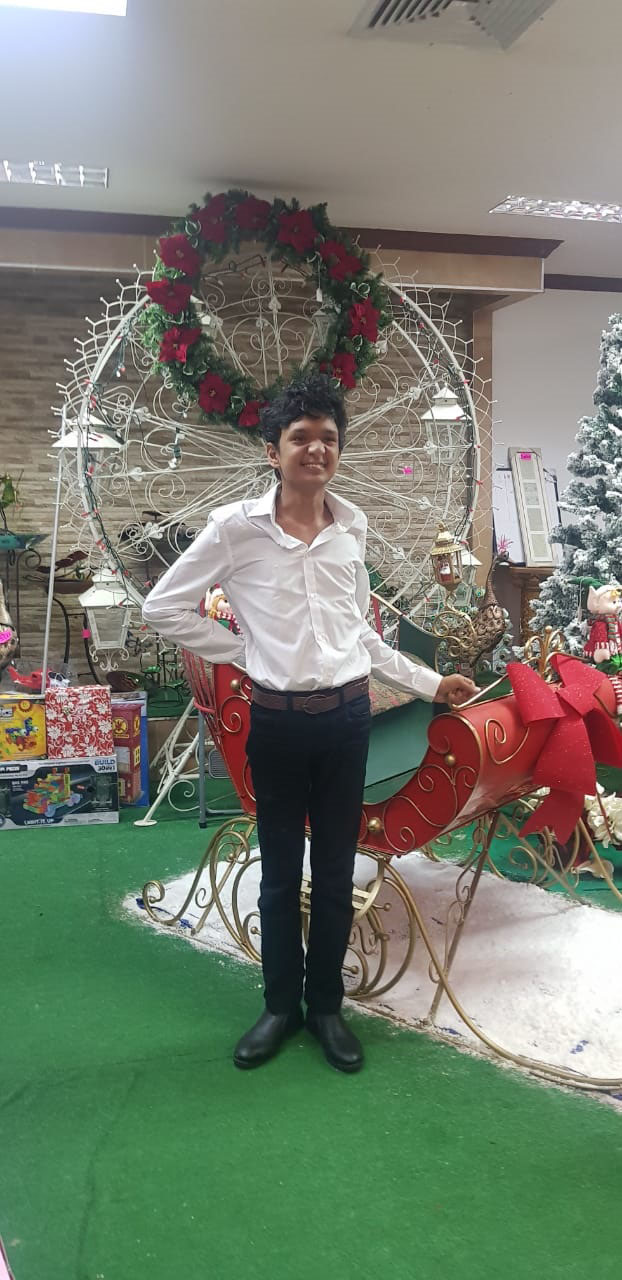Anjalena Beshpatty knew something was different about her son when he was just a few months old as little Sameir never smiled or cried. While many felt he was a good baby, his mother want to know why he was not acting like other children his age. “I know something was definitely wrong with my son as he did not smile, he did not cry, he sat by himself. He did not seek out interaction and if you put him on the bed he would just lie there. My mom even use to look at him and say he is such a good baby,” the mother told Stabroek Weekend recently.
It took almost eight years for him to be diagnosed with autism but by then Beshpatty had adopted to life accompanying her son everywhere even as she attempted to give him a normal upbringing.
Because of the struggles she endured, which included sitting with her child during his few years in the school system, being subjected to rude and at times hurtful comments and often not knowing what to do, the mother of two recently formed a foundation that caters to the needs of autistic children.

Named after her son, the Sameir Uniquely Me Foundation specialises in autism and learning disorders and the services provided include screening for autism, oral language, motor skills, preparing children for school, after-school help, classroom support, and early intervention for children with autism and learning disorders, among other things.
It was two years after visiting many doctors in an attempt to understand why Sameir was different that Beshpatty was told that her son might have autism but even then she did not understand what it meant since she had never heard the word before.
When at the age of two Sameir was neither speaking nor walking, Beshpatty said, she started investigate as while “physically he was perfect” he just was not like other children. This saw her taking him for “ear test, throat test, all the test you could think about, but nobody could tell me what was wrong with him. My son would smile but not at us, not in an interactive way.”
It was at a missionary medical outreach to which she took her son where she first heard he might have autism, but the doctors indicated that they could not do the diagnosis.
“I had never heard the word before. Imagine 16 years ago, I had never heard the word autism,” she said. This drove her to visit an internet café, since she did not have internet access at home, and where she began to research the condition.
But even after her research, Beshpatty said, the seriousness of her child’s condition did not impact her as, “all I saw was these genius people being autistic and they are so bright and brilliant and all these good things… about people who have autism”. It was later she learnt more and realized that “it was not such a great thing at all”. She said by that time her son would cry and scream whenever they had visitors and they were forced to greet persons on the road.
Just around that time, she took him to a play school where he remained for two years and she accompanied him five days a week for half day in an attempt to help him socialize with other children.
Sameir then spent three and a half years at a nursery school and once again she accompanied him.
“I heard a lot of stuff about him. [I heard that] he is retarded because of the noise he made. He walked around a lot,” the mother said sadly. However, she said, she saw some improvement in her son’s behaviour as he interacted more with children and for that she does not regret the efforts she made as if she had shut him away at home he would not have been exposed.
“It was hurtful. Sometimes when I walked away I had so much things I wished I could have said to those people but at that time I was so shocked and so hurt. I have learnt throughout the years that because of lack of knowledge people say things and they are sensitive to your feelings. I was happy that my child was not aware enough of what was happening,” she said.
She candidly shared that many days she was depressed and today there are days when she has anxiety attacks when she sees her son.
Sameir’s older sister also suffered because of her brother’s condition since the nursery school was separated by just a fence from the primary school and she would go to the fence to communicate with him. Her schoolmates laughed at her brother and called him names, and this affected her so much so that her teacher called in Beshpatty. Not a woman to be daunted, Beshpatty said, she used the opportunity to speak to children in the school, teaching them about how hurtful words were and how to accept persons who were different.
Left her job
Beshpatty said she was forced to leave her job to take care of her son and her life then revolved around her children. But because the family could not be maintained on her husband’s salary alone, the mother of two became an Avon agent and sold their products. She took her son around with her on her bicycle as she supplied customers and he became well known.
She also planted lettuce, which she supplied to restaurants to contribute to the family’s income.
It was when her son turned eight that Beshpatty met Kalawatie Ramnauth, the wife of the then Deputy British High Commissioner, who also had an autistic son. Ramnauth informed her about a doctor who was travelling from the US to Guyana.
It was that doctor, Jim Ellis, a clinical psychologist, who eventually diagnosed Sameir as being autistic and Beshpatty continued to work with him throughout the years. She has seen results as Sameir is now more friendly and receptive to people and he has developed social skills. But he is still not speaking, and it has been concluded that he is nonverbal. Now 18 years old, he uses a communication device as he understands language and he answers with the device.
Beshpatty has worked with the Step by Step Foundation, which catered for the needs of autistic children, and she was the lead tutor for about eight years up to 2018. During that time as well she travelled to the US almost every year, taking her children with her. She did courses at private schools and visited autistic schools in an effort to assist her son. She was supported by Dr Ellis, who hosted her and covered her living expenses while in the US.
With Sameir getting older, Beshpatty said, she eventually left Step by Step and then formed her own foundation.
Importantly, the foundation provides home services and Beshpatty has been helping parents to prepare children who can be in classroom settings but are not ready. She also screens children since she is trained, and this is a service she provided even while she was at Step by Step. She has a centre at her home in Cornelia Ida, West Coast Demerara, where she does screening and therapy. She also works with schools to help teachers to be supportive to children who are autistic.
Beshpatty had hoped through the foundation to create activities for older autistic children to assist them to have vocational skills and find jobs but these plans have been put on hold due to the COVID-19 pandemic.
She has seen the frustration of her son as he is home most of the time and she has to constantly find activities for him. She has created a structured schedule for Sameir, and this includes screen time, chores, and board games. He also gets to set his schedule in terms of what he wants to do first or last.
“We want to give him control of his life so we don’t demand him to do things anymore as he would cry and scream if he doesn’t want to do it. We have changed the programme to where he could ask for more time… so it gives him some kind of control of his day and he could say when he wants to do it, but it has to be done,” she said.
Ultimately, she wants her son to get to a point where he feels he is a part of society and she has been attempting to find little jobs for him, such as wiping tables, opening doors or other menial jobs just to make him feel functional, even offering his services for free. She has so far received no takers, but she continues to try.
To date, she has worked with 12 children through Sameir and she explained that the foundation does not provide a group setting for the children. She works with them individually as they all have different needs. Parents are also trained, and she would check in with the children sometimes three times a week. She uses Applied Behavioural Analysis (ABA), the only scientifically proven programme to work with children with autism. She is overseen by Dr Ellis and a speech pathologist, Dr Kerry Davis.
In the foundation Beshpatty is supported by two other persons and she explained that there is a fee attached to the work she does, and she also pays the other two tutors, one of whom is Yvonne Veerasammy.
Beshpatty said that while she is paid she has a passion for helping autistic children and her reward is seeing children develop.
“Seeing a child who didn’t know to talk, speak and helping a child to read; seeing a child who was running around all the time when I started with them, sit, that is amazing… That is what keeps me going,” she said.
She said she has never found a child who cannot learn; it is always about finding a way to teach that child.
Beshpatty can be contacted on 648-2706 or sameiruniquelyme@gmail.com.






